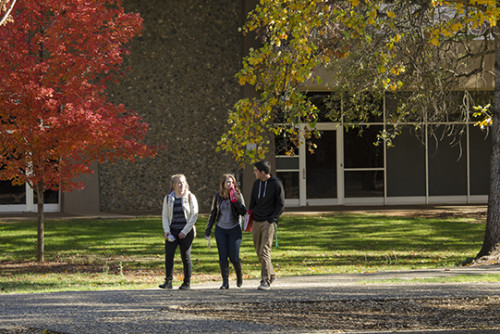University Studies: Social Sciences AA Degree
University Studies – 21 Unit Emphasis | SC Program: AA.1501
The A.A. in University Studies, Social Sciences emphasis is designed to provide students with a strong foundation for the study of humanity from diverse perspectives. It is an excellent starting point for students interested in pursuing baccalaureate degrees in anthropology, history, political science, psychology, sociology.



Choose your path
Map your education by viewing the program map for the degree or certificate you’re interested in earning below. Meet with a counselor to create your official comprehensive education plan.
A program map shows all the required and recommended courses you need to graduate and a suggested order in which you should take them. The suggested sequence of courses is based on enrollment and includes all major and general education courses required for the degree.
Fall Semester, First Year
16 Units TotalIn this course, students receive instruction in academic reading and writing, including writing processes, effective use of language, analytical thinking, and the foundations of academic research. An argumentative research essay is required for the successful completion of the course. This course may be offered in a distance education format.
This course takes an interdisciplinary approach to the study of race and ethnicity in the United States. It examines social justice movements in relation to ethnic and racial groups in the United States to provide a basis for a better understanding of the socioeconomic, cultural, and political conditions among key social groups including, but not limited to, Native Americans, African Americans, Asian Americans, and Latina/o Americans. This course examines the systemic nature of racial/ethnic oppression through an examination of key concepts including racialization and ethnocentrism, with a specific focus on the persistence of white supremacy. Using an anti-racist framework, the course will examine historical and contemporary social movements dedicated to the decolonization of social institutions, resistance, and social justice. This course may be offered in a distance education format.
This course is an introduction to psychology, which is the study of the mind and behavior. Students focus on theories and concepts of biological, cognitive, developmental, environmental, social, and cultural influences, their applications, and their research foundations. This course may be offered in a distance education format.
Spring Semester, First Year
16 Units TotalThis course is a study of the basic institutions and principles of microeconomics and so it concentrates on the parts of an economic system: the markets, the producers, the consumers, and the structures of basic industries, along with systems for relative resource use and income determination. This course may be offered in a distance education format.
This course provides an introduction to the discipline of sociology. It examines interactions among social institutions, cultures, groups, and individuals. The focus is on how unequal power relations organize the social world and shape individual lives, and how individuals negotiate their lives in different social, cultural, and economic contexts. The course will examine a broad array of topics using a variety of theoretical perspectives and sociological research methods. The primary goal of this course is to recognize how people's experiences are shaped by social forces and reshaped through human action. This course may be offered in a distance education format.
Fall Semester, Second Year
15 Units TotalThis course is a survey of the history of the United States from Pre-Columbian Peoples to the end of Reconstruction. Topics include contact and settlement of America, the movement toward independence, the formation of a new nation and Constitution, westward expansion and manifest destiny, the causes and consequences of the Civil War, and Reconstruction. This course satisfies the CSU requirement for US History (US-1). This course may be offered in a distance education format.
Spring Semester, Second Year
13 Units TotalThis course is an introduction to government and politics in the United States and California. Students examine the constitutions, structure, and operation of governing institutions, civil liberties and civil rights, political behaviors, political issues, and public policy using political science theory and methodology. This course may be offered in a distance education format.
This course examines the social, economic, political, and cultural dynamics of race and ethnicity in the United States. It utilizes theory to assess the comparative histories, cultures, and intellectual traditions of Native Americans, African Americans, Latino/as, and Asian Americans. It introduces major concepts used to understand the lived experiences of historically racialized groups such as social construction of race, racial formation, critical race theory, internal colonialism, and intersectionality. The course emphasizes the role of resistance and agency in advancing the goals of self-determination, decolonization, and equity. This course may be offered in a distance education format.
This course is a comparative survey of the major ancient world civilizations which developed between 3500 B.C.E. and 1500 C.E. It examines political institutions, religious ideologies, the rise and fall of empires, and the major cultural innovations of each of the major world civilizations. This course may be offered in a distance education format.
Please see a counselor to discuss options for meeting general education requirements for transfer to California State Universities (CSU) and/or University of California (UC) campuses, as well as any specific additional courses that may be required by your chosen institution of transfer.
*Alternative Courses: Please see a Shasta College counselor for alternative course options. You can also view the following to find other courses to meet degree/certificate requirements:
- California State Universities – General Education
- IGETC – Intersegmental General Education Transfer Curriculum
Contact Us for More Information
Counseling & Student Services
Contact InfoAcademic/Instructional Division Office
Arts, Communications & Social Sciences (ACSS)
Contact InfoStart Your Future at Shasta College
We are dedicated to helping you reach your educational and career goals. To begin your journey, apply for admissions today!
